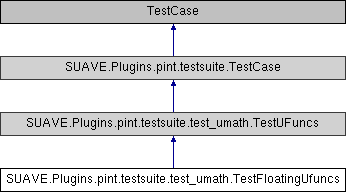|
|
def | test_isreal (self) |
| |
|
def | test_iscomplex (self) |
| |
|
def | test_isfinite (self) |
| |
|
def | test_isinf (self) |
| |
|
def | test_isnan (self) |
| |
|
def | test_signbit (self) |
| |
|
def | test_copysign (self) |
| |
|
def | test_nextafter (self) |
| |
|
def | test_modf (self) |
| |
|
def | test_ldexp (self) |
| |
|
def | test_frexp (self) |
| |
|
def | test_fmod (self) |
| |
|
def | test_floor (self) |
| |
|
def | test_ceil (self) |
| |
|
def | test_trunc (self) |
| |
|
def | qless (self) |
| |
|
def | qs (self) |
| |
|
def | q1 (self) |
| |
|
def | q2 (self) |
| |
|
def | qm (self) |
| |
|
def | qi (self) |
| |
|
def | assertEqual (self, first, second, msg=None) |
| |
|
def | assertRaisesMsg (self, msg, ExcType, func, *args, **kwargs) |
| |
|
def | setUpClass (cls) |
| |
|
def | assertSequenceEqual (self, seq1, seq2, msg=None, seq_type=None) |
| |
|
def | assertAlmostEqual (self, first, second, places=None, msg=None, delta=None) |
| |
|
def | assertAlmostEqualRelError (self, first, second, rel, msg=None) |
| |
Universal functions (ufunc) > Floating functions
http://docs.scipy.org/doc/numpy/reference/ufuncs.html#floating-functions
isreal(x) Returns a bool array, where True if input element is real.
iscomplex(x) Returns a bool array, where True if input element is complex.
isfinite(x[, out]) Test element-wise for finite-ness (not infinity or not Not a Number).
isinf(x[, out]) Test element-wise for positive or negative infinity.
isnan(x[, out]) Test element-wise for Not a Number (NaN), return result as a bool array.
signbit(x[, out]) Returns element-wise True where signbit is set (less than zero).
copysign(x1, x2[, out]) Change the sign of x1 to that of x2, element-wise.
nextafter(x1, x2[, out]) Return the next representable floating-point value after x1 in the direction of x2 element-wise.
modf(x[, out1, out2]) Return the fractional and integral parts of an array, element-wise.
ldexp(x1, x2[, out]) Compute y = x1 * 2**x2.
frexp(x[, out1, out2]) Split the number, x, into a normalized fraction (y1) and exponent (y2)
fmod(x1, x2[, out]) Return the element-wise remainder of division.
floor(x[, out]) Return the floor of the input, element-wise.
ceil(x[, out]) Return the ceiling of the input, element-wise.
trunc(x[, out]) Return the truncated value of the input, element-wise.

 Public Member Functions inherited from SUAVE.Plugins.pint.testsuite.test_umath.TestUFuncs
Public Member Functions inherited from SUAVE.Plugins.pint.testsuite.test_umath.TestUFuncs Public Member Functions inherited from SUAVE.Plugins.pint.testsuite.TestCase
Public Member Functions inherited from SUAVE.Plugins.pint.testsuite.TestCase Public Attributes inherited from SUAVE.Plugins.pint.testsuite.TestCase
Public Attributes inherited from SUAVE.Plugins.pint.testsuite.TestCase Static Public Attributes inherited from SUAVE.Plugins.pint.testsuite.test_umath.TestUFuncs
Static Public Attributes inherited from SUAVE.Plugins.pint.testsuite.test_umath.TestUFuncs